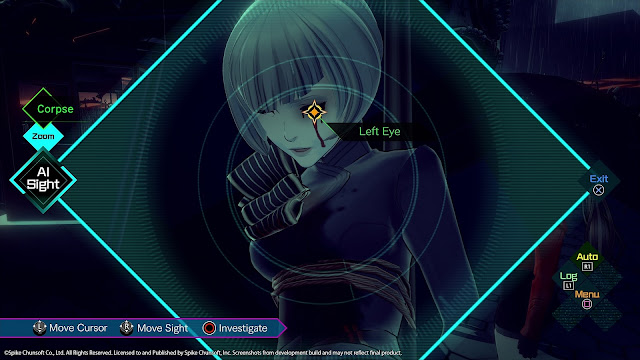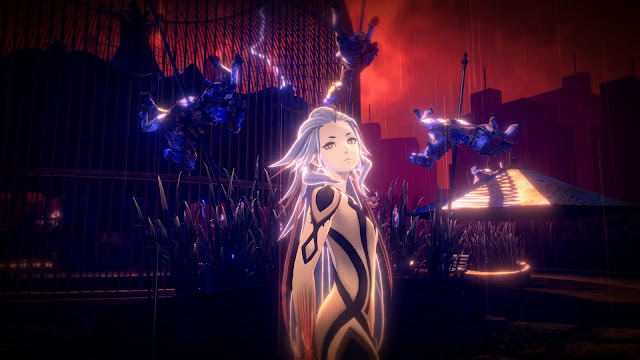Review by Matt S.
Given that AI: The Somnium Files comes from the same mind that brought us the Zero Escape series (Uchikoshi Kotaro), you should go in expecting two things: firstly, an incredible narrative. Secondly, a laboured effort at throwing “gameplay” into the storytelling. Uchikoshi has never appeared to be confident enough in his storytelling to leave it at that (quite unlike Spike Chunsoft’s fellow narrative genius, Kodaka Kazutaka, with his Danganronpa series). AI: The Somnium Files is no different.
The best way to think of AI is that it’s noir, by way of Uchikoshi’s penchant for the offbeat and surreal. All the classical elements of noir are in there. The uncomfortable relationship between the law and criminality that blurs the lines of morality is on full display as the detective you play as forms an uncomfortably pal-like relationship with yakuza. The femme fatale is there too, though in a uniquely Japanese twist it’s an (18 year-old, don’t worry folks) high school idol. Our “hero” is compromised on every level, and has a rather cynical outlook on life. He also has a close (albeit antagonistic) relationship with an AI companion, and the pseudo monologues that he shares with that apparition give us a very Raymond Chandler-like insight into the psyche of a broken soul on a self-destructive mission.
From the opening moments, as someone obsessed with noir (really, ask me to recite Polanski’s Chinatown or the 40’s classic The Big Sleep and watch me go), AI’s was compelling from the opening moments. Noir is something of a dead genre in the west, but it is thriving in Japan, thanks to literature such as Nakamura Fuminori’s The Thief and videogames from SEGA’s Judgement through to Goichi Suda’s hyper-niche The Silver Case. I’ve never really delved deep enough into Japan’s relationship between law and order and other such socio-cultural conditions that might explain the resurgence of noir in the country, but as a fan of the genre, I accept it. AI very much belongs to that tradition, and as with all Japanese new wave noir works, you can explain some breathtaking twists and turns in the narrative that make almost every moment surprising and exciting enough that you won’t be able to put down the controller.
At the same time Uchikoshi recognises some of the thematic flaws of noir – its predisposition for hyperbole and the essential lack of realism to it all (no one is as smoldering and tempting as an actual femme fatale), and has fun with AI. This game is laugh-out-loud funny at times. Sometimes it is the spot-on voice acting and the way the characters (particularly the protagonist) responds with perfect comedic beats and rhythms to the more surreal moments. At other times it’s the surreal moments themselves. AI almost adopts a Deadly Premonition tone at times – the underpinning narrative is deathly serious, but at every turn the game wants to remind you that the line between the ridiculous and the horrific is often a matter of simple interpretation.
In fact, I’d go as far as to suggest that AI feels very subversive. Without giving the narrative away, it never quite gets to a complete subversion of genre or tropes, but the narrative constantly challenges itself, as though it’s exploring itself for flaws that people might poke at it for. When it finds those, it turns them into part of the humour. It’s very, very clever writing, and it’s so keenly self-aware that it gets away with depicting some truly horrific imagery at times. Again, without giving anything away, there’s a moment where you need to replay a horrific stabbing murder over and over again, and it’s only possible to stomach it because the structure of the game is designed to make you question everything that you’re seeing.
All these storytelling moments are where AI is at its best. When it’s playing out like a visual novel, it hits the perfect balance of pacing and interactivity. You’re given just enough control to feel like you’re part of the storytelling process, while not being able to disrupt the forward thrust of the narrative to the extent that the carefully-wrought noir atmosphere starts to dissipate. This is a narrative genre where pacing is everything, and for all its merits, AI is not subversive like Deadly Premonition to be able to tear the pacing away. For this reason, the gameplay bits are a drain on the overall experience.
Every so often you’ll need to enter the psyche of someone, and there, a nightmare world of the mind’s making, you need to solve a number of puzzles in order to progress the narrative forward. Unlike in Uchikoshi’s previous works, you’re put on a very strict timer to solve these puzzles, and I did on the one level appreciate the need to think fast with puzzles that could be surprisingly demanding at times. However, these sequences are extended, despite the time limit, and while they’re going on, they’re not adding much to the flow of the narrative. The revelations come right at the end, after you solve the final puzzle, and most of the time through the middle felt like dead weight, as far as the narrative is concerned.
With that being said, the vision of these nightmare realms is something else, and in giving players control of the AI companion, for at least a while, there’s a good “second perspective” motif running through these sequences. The revelations when they come seem to have a massive impact on the flow of the “real world,” too, which is cleverly used by Uchikoshi to determine how AI arrives at its various endings. Were they simply a bit shorter, or more tightly wound around the storytelling process within the puzzles themselves, these active bits in AI would have been spot-on.
AI: The Somnium Files is such a superior storytelling experience that its hit-or-miss puzzle action is hardly an issue. By turns witty, sharp, horrific, nasty, and even at times sexy, AI: The Somnium Files is one of those games that very few people will play, but an awful lot of people should. As far as the noir genre goes, it’s every bit the example of it that Judgement is. Sure it has lower production values (and those anime fan service moments that a section of players just love to rip on), but it’s also deeply intelligent, frequently hilarious, and impossible to put down.
– Matt S.
Editor-in-Chief
Find me on Twitter: @digitallydownld
Review code provided by Numskull Games.
Please help keep DDNet running:
Become a Patreon!









